FEATURE ARTICLE -
Issue 47: Feb 2011, Speeches and Legal Articles of Interest
The Silks Ceremony was held  on 16 December 2010 and featured the following speech from Justice Dowsett.
On behalf of all members of the Court I congratulate you upon your appointments and wish you well for the future. Much of the litigation which takes place in this Court is both complex and substantial, frequently leading parties to brief two counsel and, not infrequently, more than two. We therefore have a significant and direct interest in the quality, competence and integrity of the leaders of the Bar, both nationally and locally.
In this context, the notion of leading has two quite different meanings. In its more technical sense, the term describes the process by which a more senior barrister leads one or more other barristers in the conduct of a particular case. In its wider sense, the word identifies the process of maintaining order and standards within the profession. One may lead a junior; one may also lead the Bar. Although there is some overlap, the skills and functions necessary for each role are not the same, but both are very demanding. And a silk’s constituency is quite varied. It includes juniors, solicitors and clients. It also includes the wider community, the wider profession and the judiciary. I shall limit my comments to the expectations of the last-mentioned category of which, it may be assumed, I have some knowledge.
As I have said, much of the work of this Court involves long and complex trials and appeals. They frequently warrant the engagement of senior counsel with one or more juniors. Thus the parties must make substantial investments in their matters, and the Court must provide substantial resources, particularly judicial time. That resource is in short supply and is very costly. Those who have access to it must justify that access by conducting their litigation in an economical way, in order to justify both the Court’s investment in their cases, and that of their clients.
The economical use of resources does not just happen. It will only happen if competent and conscientious lawyers master the relevant facts and law, give reasonable and timely advice, recognise strengths and weaknesses and make conscious decisions as to how available resources may be used in an economical way. This process involves a number of steps, including the following:
- Giving sound, practical advice upon which clients may reasonably act, not merely telling them what they want to hear;
- Assessing, in a realistic way, both the strengths and weaknesses of each aspect of the case and its overall merit;
- Taking account of the clients’ legitimate expectations of the litigation, but not irresponsibly raising expectations;
- Identifying the most effective and efficient way of proving what must be proven; and
- Taking hard decisions as to prospects of success, both as to individual issues and as to the case as a whole.
We are concerned that sufficient early attention is not being given to cases, with a view to identifying issues which are reasonably arguable. This is particularly so in the appellate jurisdiction. Such early assessment of the case will narrow the issues and limit the extent of discovery or, on appeal, the appeal record, the length of the trial or hearing and the cost to all involved. If such assessment is left to the week before trial or appeal hearing, it will frequently be too late to avoid much unnecessary cost, and the case will probably go on, simply because nobody is willing to face up to the fact that money has already been thrown away. We expect senior counsel, in particular, to use their wisdom, judgment, experience and standing to avoid such extravagance. In other words, we expect you to take responsibility for how your cases are conducted, not simply to do what the client might want, the solicitor might expect or the junior might prefer. It is your responsibility, not theirs. It follows that we do not expect to hear excuses from you which, explicitly or by implication, suggest that the junior, or the solicitor, or the client is to blame for some misconception or error. We, and they, expect you to accept responsibility.
The Court expects you to be active in the wider life of the profession — to lead by example, to identify and encourage talented newcomers, to advise colleagues who seek your advice, to participate in professional development programmes, to defend the profession, its standards and traditions, to uphold the rule of law and to defend the judiciary against misconceived and ill-motivated criticism, whether such criticism be from clients, politicians or otherwise. We also expect that you will be strong enough, perhaps fearless enough, to raise with us your concerns regarding the Court and its processes. We do not expect that you will participate in public criticism of us without first attempting to resolve any problems by direct contact, personally or through the Bar Association.
In return, we will pay you the respect due to senior members of a great profession. Of course, that will not help you to win particular cases.
Again, we congratulate you upon your appointments and look forward to seeing you here in the future.





